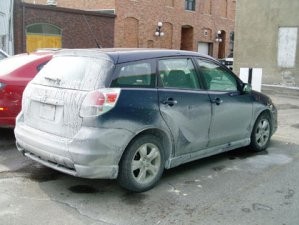Winter driving brings exposure to the elements, but your car must also endure the accumulation of road salt used in snow-covered areas. This can cause damage over time and should be addressed before it becomes an issue.

Source: girlsautoclinic.com
By keeping your car maintained and cleaning your garage, you can protect them from the corrosive effects of road salt. You’ll be able to proceed through the winter months with ease and ensure that your car and garage are well protected.
The Need for Road Salt
What we may see is a contributor to car rust, but road salt is a necessity during the harsh Canadian winters. It’s been used for decades to keep drivers safe from the dangers of ice that builds up on the roads. It’s an inexpensive and effective way to combat freezing ice and is simple to use.
Road salt, unfortunately, can have negative effects on your vehicle. It can build up underneath the automobile and will lead to rust and corrosion.
Over time, road salt can damage the finish on your car and even damage the components leading to costly repairs. The doors, hood, and fenders of your car are most susceptible to damage because they are moisture traps.
Even worse, when you bring your car into your garage, road salt can be transferred onto the flooring.
Protecting Your Car
The easiest way to protect your car from the effects of road salt is to wash it regularly. This helps fight the corrosion caused by the salt while protecting all components of your vehicle.
It’s recommended that you wash your car at least every 10 days, even in the winter. But be careful not to wash it in extremely cold temperatures. You should wait until temperatures have reached at least 4 degrees Celsius before washing.
The winter temperatures can freeze locks and other components of your car. As a result, you’ll want to use all doors repeatedly after washing to prevent this. Avoid washing your car late in the evening so that it’s not attempting to dry during the coldest part of the day.
If you encounter high levels of snow on the road, it’s best to avoid driving through it. This can cause the snow to be deposited in the underside of the car and in hard to reach areas, which can create problems with brakes and ventilation systems. Unless the road is plowed enough as to only cover the bottom four inches of your tires, it should be avoided!
Protecting your Garage Flooring
The chemicals used in road salt can easily damage the flooring in your garage. Calcium chloride and liquid magnesium are eventually deposited on the floor from your car. Because concrete has pores, these chemicals can penetrate over time.
The easiest solution to protect your garage is by installing Rhino Floortex Coating. It allows you to easily wipe off or sweep away any road salt that has been brought in on your car tires, and prevents the salt from penetrating the floor, saving it from being effected by the corroding elements.
If you only have a concrete garage floor, the chemicals in the concrete can freeze and expand when temperatures drop, leading to cracks in your garage.
Snow mats can be used to collect the water that comes off of your vehicle and protect the flooring. In addition, using a quality floor coating will add another layer of protection for the winter.
Road salts are necessary to keep the road safe but can cause unwanted damage to your vehicle and garage. Keeping your car clean and protecting your garage with a proper floor coating will ensure that you’re fully guarded against another cold winter season!